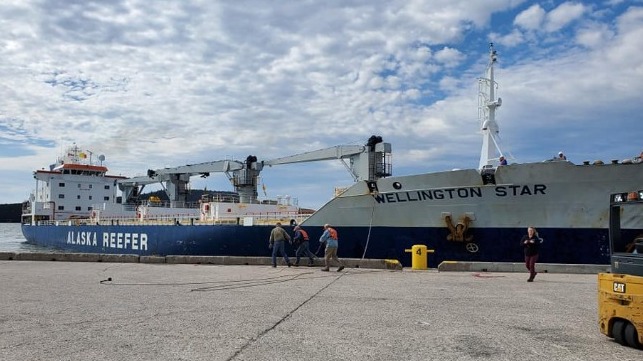Opinion: Alaskan Seafood Should Ship on Jones Act Vessels

Much has been written in recent weeks about the Alaskan pollock "Canadian railway" shipping scheme, including three Wall Street Journal editorials using the conflict as an excuse to reinforce its antipathy toward the American maritime industry and the Jones Act. We view the matter differently.
America’s domestic shipping law (the Jones Act) requires that those providing ocean transportation services between American points must hire American workers, pay American taxes and obey American laws. Foreign ships and operators are not required to hire American workers, pay American taxes or obey most American laws, and are banned from US domestic markets.
In addition to affirming American sovereignty over its domestic maritime commerce, the Jones Act provides hundreds of thousands of good-paying jobs to American shipbuilders and mariners. In so doing, it has helped to preserve a critical mass of Americans who know how to build and operate ships so that we have an American maritime industry that can be scaled up if needed for military activation.
Extraordinary government support provided to China’s largely state-owned commercial shipping and shipbuilding industry (estimated at more than $15 billion annually) suggests that it may well be time to start scaling up American maritime. The last thing we should be doing is tearing it down by clever evasions.
Which brings us to the fish story. The Jones Act cannot be avoided by transshipping product from one US point to another US point through a foreign port. An exception to this “no transshipment” rule was grandfathered into the original Jones Act a century ago, allowing certain routes that were then moving in part over a Canadian railroad to continue operating. While the rationale for the Canadian railroad exception has long since evaporated, the language stayed on the books.
Most American fishing companies in Alaska ignored the exception and have used American ships to ferry their catch to Seattle for on-carriage to points throughout America. But a few companies decided to take advantage of the exception so that they could avoid using American ships and American workers apparently to save a few pennies on their shipping costs.
Those companies’ operations, however, did not qualify for the exception. They failed to maintain the required official notice of routes and placed truckloads of fish on a 100-foot “railroad” wholly inside a Canadian marine terminal. Each trailer was moved a few feet back and forth on this “railroad” and then trucked to the US destination. This obvious sham operation makes a mockery of the Jones Act exception, the rule of law, and the hundreds of thousands of hardworking Americans in our maritime industry.
Notably, American fishing companies themselves operate under more stringent rules than the Jones Act, since the fish they harvest are in American waters. They also enjoy the protection of the US Navy and Coast Guard to prevent poaching by foreign fishing fleets. One might expect that they would in turn use American ships for the small portion of their catch that goes to American consumers.
CBP eventually blew the whistle and assessed penalties totaling more than $350 million based on the number of shipments moved illegally over several years. When the penalties were issued, the equivalent of about 550 container loads of fish were in transit on ships moving from Alaska through the Panama Canal to Eastern Canada, or in storage in Canada.
The violator sued CBP and a federal court in Alaska ruled last week that this “stranded” fish could be moved to the US destination with no penalties assessed, and that the sham route could continue to be used pending the litigation’s outcome. Yet to be decided is whether the court will overturn CBP’s decision that the sham route is not lawful. Also, the violator has begun a process with CBP seeking to mitigate its penalties.

that matters most
Get the latest maritime news delivered to your inbox daily.
We cannot predict the ultimate outcome of this proceeding. We hope the court upholds CBP’s authority to declare such an obvious evasion of the Jones Act illegal. We also hope that the violator starts to behave like an American company and transitions its supply chain back to using American ships and workers to get its product to destinations in America. Doing so would create jobs for American mariners and in American shipyards, help strengthen our national security, and level the playing field with its competitors. And then Congress should take the final step and repeal the dead letter provision that enabled this conflict to develop.
Michael Roberts is President and Chairman of the American Maritime Partnership, a coalition representing nearly all segments of America’s domestic maritime industry.
